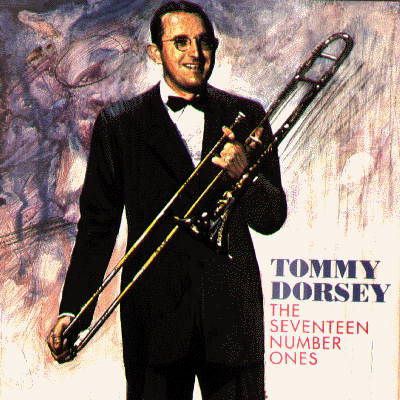 |
From the Vault...
04/25/2010
#1200 |

|
info
Tommy Dorsey
"The Seventeen Number Ones"
© RCA/BMG Records
Year of Release: 1990
Rating:



|
track listing
Marie
The Music Goes 'Round
And Around
Alone
On Treasure Island
Satan Takes A Holiday
You
The Big Apple
Music Maestro Please
All The Things You Are
The Dipsy Doodle
Our Love
Once In A While
Indian Summer
Dolores
I'll Never Smile Again
There Are Such Things
In The Blue Of Evening
|
WSVNRadio Archives
Tommy Dorsey related sites:
|
|
|
Tommy Dorsey
"The Seventeen Number Ones"
Now, This IS Music... The Big Band sounds of the 1940s is something we miss today. Sure, crooner singers
such as Michael Buble and Harry Connick Jr., and even the Brian Setzer Orchestra pops up from time to time, but we
need more of this kind of music. Travel back in time, where Big Band Music ruled the music charts. The Dorsey
Brothers (Jimmy & Tommy), as well as other bandleaders were getting alot of radio airplay (and some had their own
radio shows). Tommy Dorsey's The Seventeen Number Ones showcases the very best in Big Band music.
From Tommy Dorsey's Wikipedia page:
Tommy Dorsey had a run of 286 Billboard chart hits. The Dorsey band
had seventeen number one hits with his orchestra in the 1930s and 1940s including: "On Treasure Island", "The Music
Goes 'Round and Around", "You", "Marie", "Satan Takes a Holiday", "The Big Apple", "Once in a While", "The Dipsy
Doodle", "Our Love", "All the Things You Are", "Indian Summer", and "Dolores". He had two more number one hits in
1935 when he was a member of the Dorsey Brothers Orchestra: "Lullaby of Broadway", number one for two weeks, and
"Chasing Shadows", number one for three weeks. His biggest hit was "I'll Never Smile Again", featuring Frank Sinatra
on vocals, which was number one for twelve weeks on the Billboard pop singles chart in 1940. "In the Blue of Evening"
was number 1 on the Billboard pop singles chart in 1943.
So, most of Tommy Dorsey's number ones were from the 1930s, with his brother, and on his own. What was interesting
to learn, is that most bandleaders "introduce" singers, where some would become popular on their own. The most popular
singer from Dorsey's career was a young crooner by the name Frank Sinatra. 3 songs Sinatra sang with Dorsey's
orchestra are here: "I'll Never Smile Again," "There Are Such Things," and "In The Blue of Evening."
Other singers to mention on this collection were Tommy Dorsey's Clambake Seven, Edythe Wright, Jack Leonard, Cliff
Weston, The 4 Esquires, Frank Sinatra with the Pied Pipers.
There isn't one bad track on this collection for the big band lovers. Other bandleaders come to mind while
listening to these 17 tracks: Sammy Kaye, Cab Calloway, Count Basie, Glenn Miller, Harry James, and others I can't
seem to mention, and others who can.
But still, this kind of music is deeply missed in today's popular music. It was great for Brian Setzer to bring
this music back, and with the crooners such as Harry Connick Jr., Michael Buble, and for the females, Diana Krall.
But in today's world, there isn't enough of Big Band music, unless you find it on today's Internet radio stations.
It's been too long since this kind of music would surface again in the Top 5 of today's popular hits. However,
Michael Buble has had two albums reach #1 on the Billboard albums chart. Some may even compare this old-fashionhed
music to that of Susan Boyle. Slowly but surely, maybe someday we will see Big Band resurface on a more popular level.
In the meantime, we have our own collections of Big Band music to listen to, and of course, stations on the Internet
that feature just Big Band music and Jazz.
But Tommy Dorsey's music is still being enjoyed today, and has been introduced to newer music fans. His
Seventeen Number Ones only proves that this music can be far better than today's hip-hop rap, and even today's
Country Pop. Big Band music is still popular in most people's eyes and ears. It's just only a matter of time, if
and when this kind of music will resurface full charge, and be enjoyed far more, as it could possibly dominate the
singles and album charts, courtesy of Billboard Magazine (?)
© WSVNRadio.net. All rights reserved.
Review or any portion may not be reproduced
without written permission. Cover art is the
intellectual property of
RCA/BMG Records
and is used for reference purposes only.
|
|





